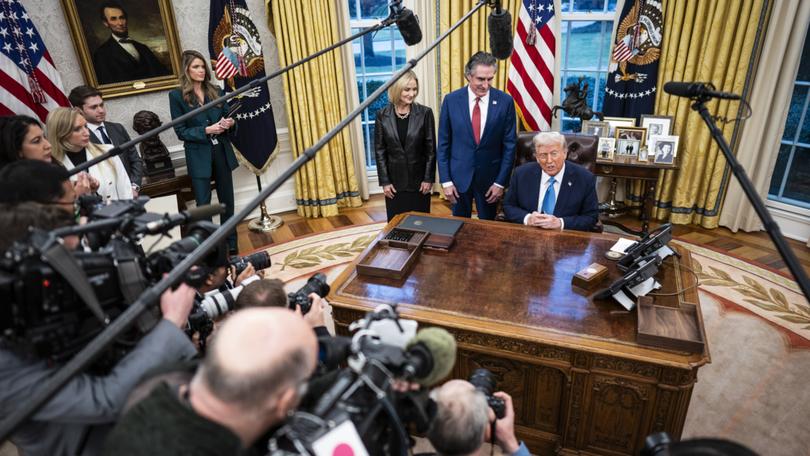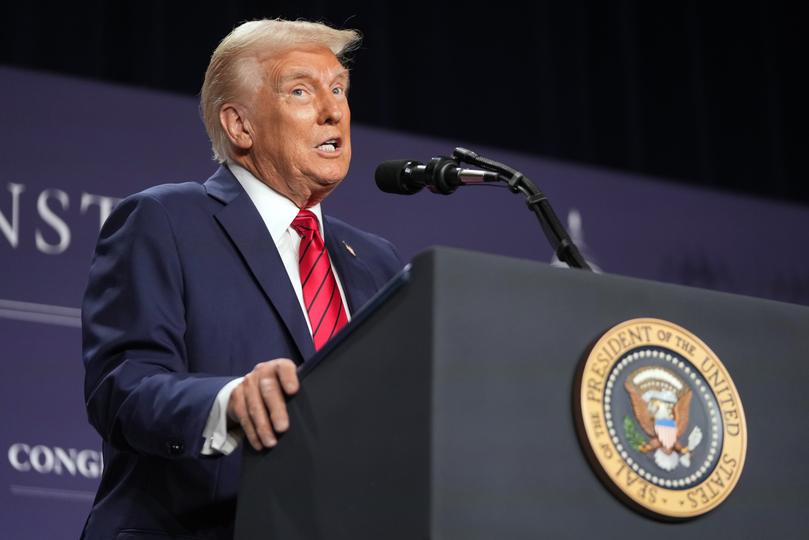The Washington Post: Donald Trump sketches an unprecedented plan for sweeping tariffs
The comprehensive roster of products that may soon become noticeably more expensive for American consumers and businesses runs from industrial metals and commodities to wine, beer, lumber and medicine.

President Donald Trump on Friday dramatically expanded his plans for a global trade war, confirming that he will impose tariffs on Canada, Mexico and China on Saturday and announcing plans for additional import taxes on European goods, semiconductors, pharmaceuticals, steel, aluminum, copper and oil and gas.
The comprehensive roster of products that may soon become noticeably more expensive for American consumers and businesses runs from industrial metals and commodities to wine, beer, lumber and medicine.
Speaking in the Oval Office, the president denied that his enthusiasm for tariffs represented a negotiating device or that he was seeking specific concessions from other countries.
Sign up to The Nightly's newsletters.
Get the first look at the digital newspaper, curated daily stories and breaking headlines delivered to your inbox.
By continuing you agree to our Terms and Privacy Policy.He repeated his familiar complaints that China, Canada and Mexico are responsible for a flood of fentanyl into the United States, which he said was killing “hundreds of thousands” of Americans each year.
Taken as a whole, Trump’s comments represented the most extensive menu of trade threats levied by a U.S. president in decades. If implemented as permanent measures, they would dramatically reshape U.S. commercial ties with other countries and hamstring the global economy.
The president acknowledged that such extensive tariffs could cause Americans “some temporary short-term disruption,” but he added, “People will understand that.”
He dismissed concerns that placing steep taxes on many foreign goods would lead to renewed inflation in the United States, where prices are still rising faster than the Federal Reserve’s target.

“Tariffs don’t cause inflation. They cause success,” the president said.
Trump’s sole concession to potential sticker shock from his plans for higher import taxes was to say that he would “probably” set the tariff on Canadian oil imports at 10 percent rather than 25 percent.
The president leveled particularly sharp criticism at the European Union, saying he “absolutely” would impose tariffs on their shipments to the United States.
“We are treated so badly they don’t take our cars, they don’t take our farm products, essentially, they don’t take almost anything. And we have a tremendous deficit with the European Union. So we’ll be doing something very substantial with the European Union,” he said.
As is his custom, the president provided few details of his plans for new trade barriers. But he said he would put new taxes on imported oil and gas on Feb. 18 and aimed to do the same for steel and aluminum this month or next month.
“It’ll be a tremendous amount of money for our country, tremendous amount,” the president said, repeating his erroneous claim that foreigners pay U.S. tariffs. “Tariffs are going to make us very rich and very strong.”
In fact, American importers pay tariffs to U.S. Customs and Border Protection when they collect their imported goods at U.S. ports.
Ultimately, the burden of that tax is shared by the American importer, the foreign producer and the final customer, and varies depending upon specific market conditions.
But in most cases, tariff costs are “almost entirely borne by U.S. firms and consumers,” according to a 2020 study by economists at the Federal Reserve Bank of New York, Princeton University and Columbia University.
The president’s rhetorical salvo late Friday came as companies in the United States, Canada and Mexico braced for a formal tariff announcement. Earlier, White House press secretary Karoline Leavitt confirmed that the president will impose tariffs of 25 percent on goods from Canada and Mexico and 10 percent on products from China.
Americans last year bought approximately $1.3 trillion worth of merchandise from those three countries, according to the Census Bureau.
The new taxes are expected to roil the North American economy, risking the reignition of inflation in the United States, a possible recession in Canada and a deepening downturn in Mexico.
Major industrial supply chains that extend across the U.S. northern and southern borders face imminent disruption. The auto industry is particularly vulnerable with parts and half-finished vehicles crossing North American borders multiple times before being completed.
As Trump has amplified his trade threats, Wall Street betrayed little sign of concern. The Dow Jones Industrial Average dropped less than 1 percent on Friday and investors remain convinced that the president’s tariffs will be used as negotiating leverage in talks with Canada and Mexico over immigration and drug smuggling, according to economists at Barclays Bank.
In Mexico City, President Claudia Sheinbaum said Mexico was prepared to retaliate.
“We have Plan A, Plan B, Plan C, depending on what the government of the United States decides,” she told her daily news conference Friday. “It’s very important that Mexicans know that we will always defend the dignity of our people, respect for our sovereignty and a dialogue among equals [with the U.S.], not with subordinates.”
She did not provide details but has said Mexico was prepared to target U.S. products with countermeasures.
Mexico has been scrambling to negotiate with Washington, but it’s been difficult because many of Trump’s appointees have not yet been confirmed. The government has used intermediaries in the business community to send messages to the White House, officials said.
Sheinbaum noted that Mexico has been open to receiving its citizens sent back under Trump’s plan for mass deportation of unauthorized migrants and that it was prepared to take some from other countries, which represented a concession.
Mexico is the No. 1 trade partner of the United States, and sends 80 percent of its exports north. Officials emphasized how much pain the tariffs will inflict on U.S. companies and consumers.
Mexico’s top exporter to the United States is General Motors, a U.S.-based firm, Commerce Minister Marcelo Ebrard said Friday.
Mexico is the No. 1 source of cars, computers, televisions and refrigerators sold in the United States, he said. One of every three refrigerators bought by Americans is made in Mexico, which also is the main supplier of screens for computers and televisions, he said.
“If these tariffs are imposed, your consumers are going to face higher prices,” he said, addressing Americans. “Let’s be clear. The biggest impact will fall on families in the United States, who will have to pay 25 percent more.”
Mexico also supplies around half of America’s imported fruit and two-thirds of imported vegetables, in dollar terms - tomatoes, berries, bell peppers, cucumbers. And it’s the largest source of imported beer. Mexico also is the No. 1 provider of medical devices to American hospitals and doctor’s offices, from surgical gloves to scalpels.
Canada also has been struggling to decipher Trump’s plans. After the November presidential election, Prime Minister Justin Trudeau and provincial leaders appeared on U.S. television networks to tout the importance of cross-border trade. Several cabinet ministers were in Washington this week on a last-ditch effort to stop the levies.
But Trump’s myriad justifications for the tariffs have left the Canadian government puzzled over the best response.
“Determining what exactly it is that President Trump wants is not a simple thing,” Jonathan Wilkinson, Canada’s energy minister, said this week.
After Trump tied tariffs to what he called an “invasion” of migrants and fentanyl, Canadian officials in December unveiled a $900 million border plan. Only 1.5 percent of migrants apprehended by U.S. Customs and Border Protection in the 2024 fiscal year and 0.2 percent of fentanyl seized at U.S. borders came from Canada.
The small number of migrants and fentanyl crossing the border, coupled with Trump’s frequent complaints about the U.S. trade deficit with Canada and musings about using tariffs to raise revenue and reshore manufacturing, has fueled concerns that the border complaints are a pretense.
Canadian officials have said that they will retaliate with their own tariffs on billions of dollars worth of U.S. goods. They have not ruled out slapping export taxes on Canadian crude oil or restricting energy exports, an idea that is controversial in the oil-rich prairie provinces.
“If the president does choose to implement any tariffs against Canada, we’re ready with a response - a purposeful, forceful but reasonable, immediate response,” Trudeau said Friday. “We won’t relent until tariffs are removed and, of course, everything is on the table.”
© 2025 , The Washington Post
